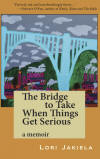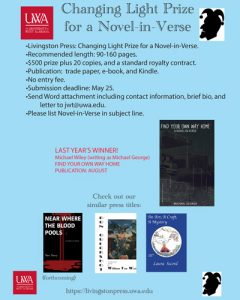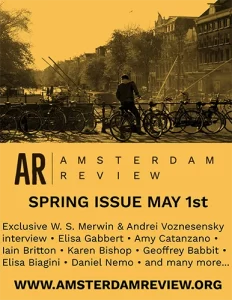The Bridge to Take When Things Get Serious
In her previous memoir, Miss New York Has Everything, Lori Jakiela—an adopted only child—wrote about leaving her childhood home in Pennsylvania to work as an international flight attendant based in New York City, hoping to fulfill her childhood dream of becoming a writer. Jakiela, who directs the writing program at The University of Pittsburgh-Greensburg and teaches in the MFA in Creative Writing program at Chatham University, writes here about the next phase of her life, after her father’s death and leaving New York City, her job, and her boyfriend to return to Pittsburgh and care for her ailing mother.
In her previous memoir, Miss New York Has Everything, Lori Jakiela—an adopted only child—wrote about leaving her childhood home in Pennsylvania to work as an international flight attendant based in New York City, hoping to fulfill her childhood dream of becoming a writer. Jakiela, who directs the writing program at The University of Pittsburgh-Greensburg and teaches in the MFA in Creative Writing program at Chatham University, writes here about the next phase of her life, after her father’s death and leaving New York City, her job, and her boyfriend to return to Pittsburgh and care for her ailing mother.
Although Jakiela devotes most of her time and attention to caring for her mother, the woman’s harsh words and insults frequently wound her. For instance, Jakiela tells her mother she doesn’t like meatloaf, and the elder woman responds, “You think you’re too good for meatloaf?” To portray her immersion into her mother’s world, the writer explains that even though she rents an apartment near her mother’s house, she spends most nights sleeping in her childhood bedroom, “with a Donald Duck nightlight and a mother who tries to regulate [her] bedtime.” When her mother tells Jakiela to go back to her apartment, “You have your own things to worry about. You need your own space,” the writer realizes, “What she’s talking about, I don’t know.”
Jakiela empathizes with her mother’s frustration, grief, and rage at her failing health and the loss of her husband of fifty years, even though she’s often the object of this aggression, which exacerbates the ever-present tension that complicates their relationship. During one conversation, the mother shares her plans to go out of town for the weekend, and Jakiela assumes she will look after the house. But her mother insists that she isn’t welcome, reminding the writer of two important childhood lessons about adoption—to be grateful and to “know your place.”
Jakiela begins a relationship with her future husband, and her unexpected pregnancy before their engagement widens the chasm between her and her mother, who is ashamed of her daughter’s appearance and the situation, which she interprets as a social impropriety. For example, Jakiela relates a confrontation in which her mother says, “If I’d ever been pregnant, I wouldn’t have left the house for nine months. I wouldn’t go anywhere looking like you.” In another conversation, Jakiela reminds her mother that she’s not the only woman who’s found herself unexpectedly pregnant, to which her mother replies, “If a lot of people jumped off the Westinghouse Bridge, would you jump too?” The writer explains this reference to the titular landmark, which “as every Pittsburgher knows, is the bridge to take when things get serious, which means it’s the bridge to take when you’re serious about killing yourself.”
The writer doesn’t contemplate suicide; however, early in her pregnancy, she considers having an abortion but changes her mind when she realizes that, after having lost her father and facing the inevitability of losing her mother, she “can’t do any more loss.” She illuminates her eventual decision to become a mother by disclosing a memory of an experience on a plane while working as a flight attendant, when a pilot pointed out to her a sight, rarer than the Northern Lights: a sliver of orange light just above the horizon that “divides dark from dark.” The line, she recalls, was “bright enough to navigate by.” This light becomes a metaphor for her unborn child, who lights the path to her future.
This book portrays the evolution of Jakiela’s relationship with her mother, as well as her journey to a stable adult life as she experiences marriage, childbirth, depression, and her mother’s illness and eventual death. Jakiela displays numerous photographs of her deceased mother around her house and frequently talks about her with her two young children—the daughter with whom she was unknowingly pregnant when her mother died, and her son, who was a toddler when she died and who often claims to communicate with her. In one instance, he exclaims, “My old grandma was the best friend I ever had.” Seeing her mother through her son’s eyes and seeing the world through the eyes of a mother combine to soften Jakiela’s opinion of her mother and expand her perspective. Five years after her mother’s death, while baking bread with her daughter, Jakiela realizes that baking bread alone in the kitchen offered her mother the solitude that she enjoys as a writer alone in her office, that solitude that Virginia Woolf called a “room of one’s own.” In the kitchen that day with her daughter, the dough, and the aromatic freshly baked bread, Jakiela feels the weight of her mother’s love and the weight of her loss, and the reader recognizes the strong bond she is forging with her children. The writing is clear and original, and the story is moving without being sentimental. Readers will enjoy following this writer’s journey through adoption, motherhood, marriage, and grief.





